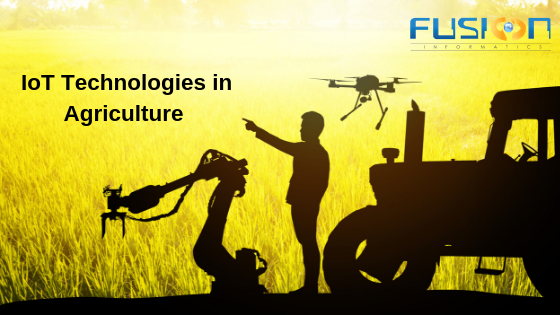HOW IOT CAN EXECUTE SMART FARMING TECHNOLOGIES IN THE AGRICULTURE INDUSTRY
IoT can have an impact on the globally, advanced industries, connected vehicles, including smart cities are all elements of the IoT equalization. However, the application of technologies such as the Internet to the agricultural sector could have the greatest impact. The population of the world is expected to reach 9.6 billion people by 2050. Thus, to feed this large population, the agricultural sector must adopt IoT. Intelligent agriculture based on IoT technologies will enable producers and farmers to reduce waste and improve productivity, ranging from the amount of fertilizer used to the number of trips made by agricultural vehicles. In terms of the environment, IoT-based smart agriculture can offer great benefits, including more efficient use of water or optimization of inputs and treatments. Let's talk now about the main applications of IoT-based smart agriculture those are revolutionizing agriculture.

Accuracy Farming
Accuracy Farming Also known as precision farming, precision farming can be considered as anything that performs farming practices more controlled and reliable when it becomes to raising livestock or growing crops. In this approach to farm management, the use of information technology and various elements such as sensors, control systems, robotics, autonomous vehicles, automated equipment, variable flow technology, etc.
The manufacturer's adoption of high-speed broadband access, mobile devices and reliable low-cost satellites (for imaging and positioning) is one of the key technologies that characterize the trend of precision farming. Accuracy farming is one of the most popular uses of IoT in the farming sector and various organizations use this technique globally. Crop Metrics is an organization specializing in precision agriculture focused on state-of-the-art agronomic solutions while specializing in the management of precision irrigation. Crop Metrics products and services include VRI optimization, soil moisture probes, PRO virtual optimizer, and more. Variable Rate Irrigation (VRI) optimizes the profitability of irrigated crops with topography or soil variability, improves yields and increases the efficiency of water use. Soil moisture sensor technology provides comprehensive local agronomic support in season and recommendations for optimizing water use efficiency.
Livestock Monitoring
Owners of large farms can use wireless IoT applications to collect data on the location, welfare, and health of their cattle. This information helps them identify sick animals to separate them from the flock, thereby preventing the spread of the disease. It also reduces labor costs because ranchers can locate their livestock using IoT-based sensors.
Livestock owners to see pregnant cows and about to give birth. From the heifer, a sensor powered by a battery is expelled when its waters break. This sends information to the herd manager or breeder. In the time spent with the heifers that give birth, the sensor allows farmers to be more focused.
Smart Greenhouses
Greenhouse agriculture is a methodology that improves the yield of vegetables, fruits, crops, etc. Greenhouses control environmental parameters through manual intervention or proportional control. Since manual interventions lead to production losses, energy losses, and labor costs, these methods are less effective. This design intelligently monitors and controls the climate, eliminating the need for manual intervention.
This reduces the requirement for continuous manual monitoring. Inside the greenhouse, the cloud server also allows data processing and performs a control action. This design provides cost-effective and optimal solutions for farmers with minimal manual intervention.
IoT sensors in the greenhouse provide information on brightness levels, pressure, humidity, and temperature. These sensors can automatically control the actuators to open a window, turn on lights, control a heater, turn on a fogger, or turn on a fan, all controlled by a Wi-Fi signal.
Conclusion
In this way, IoT agricultural applications enable farmers and farmers to collect useful data. Big landowners and small farmers require knowing the potential of agriculture in the IoT market by introducing smart technologies to improve the competitiveness and sustainability of their stock. With speedy population growth, the market can be met if pastoralists, as well as small-scale farmers, implement successful agricultural IoT solutions.
Fusion informatics is the topmost IoT app development company in Doha, Qatar. We present our services to start-ups and other companies in Qatar. We have a team of experts in IoT development and can build IoT apps which will be helpful to the users and companies. Contact us for improving your business and stay ahead in the competition. And Fusion Informatics has always been considered as one of the Best Mobile App Development Company in Doha, Qatar. Mobile Application Development is an area that goes beyond the creation of a convincing user interface.
To Know More:-
Paytm Like App Development Cost
Ecommerce Mobile App Development Cost In Bangalore
Bitcoin Wallet App Development Company
Cost of an app development like Byjus
Cost of app development like Ola
Cost to develop healthcare app like Practo
Best chatbot development companies in Qatar



